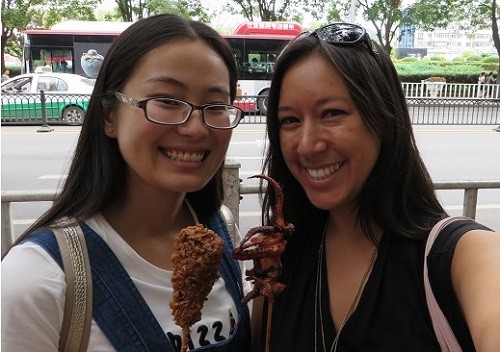Top 10 Best Ways to Learn Chinese
Are you still looking for ways to study Mandarin Chinese, please check the following 10 best ways to learn Chinese and hope these tips can help you improve your Chinese language fast.
1. Immersion
 Probably the best way to learn Chinese, but at the same time the scariest. Living abroad in a new culture surrounded by strange new things may sound terrifying, but in the end, will probably be the most worthwhile life experience you ever have, and on top of that, you get to learn Chinese in China. There are many programs for learning Chinese in China, and all of them have friendly staff ready to help you take the next step.
Probably the best way to learn Chinese, but at the same time the scariest. Living abroad in a new culture surrounded by strange new things may sound terrifying, but in the end, will probably be the most worthwhile life experience you ever have, and on top of that, you get to learn Chinese in China. There are many programs for learning Chinese in China, and all of them have friendly staff ready to help you take the next step.
2. Group classes
 Group classes are the second best way to learn Chinese because you will do a ton of talking with all the other students in the class. Another great thing about a group class is you don’t need to worry about looking silly when you speak because everyone is at roughly the same level and you can all mess up together and laugh together. Group classes are the most common way people learn Chinese and they are a lot of fun and good way to make friends who are also interested in learning Chinese.
Group classes are the second best way to learn Chinese because you will do a ton of talking with all the other students in the class. Another great thing about a group class is you don’t need to worry about looking silly when you speak because everyone is at roughly the same level and you can all mess up together and laugh together. Group classes are the most common way people learn Chinese and they are a lot of fun and good way to make friends who are also interested in learning Chinese.
3. Tutor
 A tutor is great if you aren’t a group class kind of person. A tutor moves at your pace and you can decide what you want to learn. For me, I was very interested in the business world of China so I decided to focus my language studies on business vocab. A tutor was perfect for this because I was able to have 1-on-1 business like ‘meetings’ with her and use words I needed for the China business world.
A tutor is great if you aren’t a group class kind of person. A tutor moves at your pace and you can decide what you want to learn. For me, I was very interested in the business world of China so I decided to focus my language studies on business vocab. A tutor was perfect for this because I was able to have 1-on-1 business like ‘meetings’ with her and use words I needed for the China business world.
4. HSK

This might be my most favorite way for learning Chinese. The New HSK (for those who don’t know) is a standardized test for language proficiency in Mandarin. There are 6 levels, 1 being the most basic and 6 being the most advanced. When I first started learning Chinese in college, I was learning words like 墙纸qiangzhi (wallpaper). How or when will I want to use this word!? I knew there was a better way to pick up words that would really help me learn Chinese, and that’s when I found the HSK vocab lists. These lists contained the most commonly used grammar structures and words that would help boost my Chinese learning speed.
5. Language partners
 Language partners are probably the most fun way to learn Chinese. You can meet up to do activities and learn as you go. My language partners helped me boost my every day spoken Chinese, including learning trending slang and maybe the occasional bad word. We would often meet in a coffee shop to talk or go play a sport like basketball. My language partners not only helped me learn the Chinese language but also a lot about Chinese culture!
Language partners are probably the most fun way to learn Chinese. You can meet up to do activities and learn as you go. My language partners helped me boost my every day spoken Chinese, including learning trending slang and maybe the occasional bad word. We would often meet in a coffee shop to talk or go play a sport like basketball. My language partners not only helped me learn the Chinese language but also a lot about Chinese culture!
6. Online/Skype Lessons
 So many people believe that learning online or using Skype to learn Chinese is a waste of time, they are WRONG! Many people just don’t have the time or money to get over to China to study; this is the next best thing! You can chat with Chinese natives online and learn the language just like if you were sitting with them in a coffee shop in downtown Beijing. The best part about online and Skype lessons is that they always fit any schedule.
So many people believe that learning online or using Skype to learn Chinese is a waste of time, they are WRONG! Many people just don’t have the time or money to get over to China to study; this is the next best thing! You can chat with Chinese natives online and learn the language just like if you were sitting with them in a coffee shop in downtown Beijing. The best part about online and Skype lessons is that they always fit any schedule.
7. Wechat
 Ok, if you have been to China then you have to know about Wechat (Wēixìn微信), and if you haven’t been yet, then you need to download it right now on your smartphone. In China, it is more common for people to ask for your WeChat ID than your phone number. WeChat is a mobile text and voice messaging service developed by Tencent Holdings Ltd. (Téngxùn 腾讯). This is the ultimate tool for making Chinese friends and texting/talking with them. It is embarrassing to say, but my writing probably improved most just from typing in Chinese to my friends on Wechat. There are also a ton of other amazing China apps that you can download to make your time learning and traveling through China much more comfortable.
Ok, if you have been to China then you have to know about Wechat (Wēixìn微信), and if you haven’t been yet, then you need to download it right now on your smartphone. In China, it is more common for people to ask for your WeChat ID than your phone number. WeChat is a mobile text and voice messaging service developed by Tencent Holdings Ltd. (Téngxùn 腾讯). This is the ultimate tool for making Chinese friends and texting/talking with them. It is embarrassing to say, but my writing probably improved most just from typing in Chinese to my friends on Wechat. There are also a ton of other amazing China apps that you can download to make your time learning and traveling through China much more comfortable.
8. Self-practice
This is maybe my least favorite way to learn Chinese. Having said that though, it should be noted that it is also a very effective way to learn Chinese (if you are self-motivated). I spent many hours sitting in Starbucks with my vanilla latte reading Chinese books and making my own Chinese vocab lists. Individual practice is great if you need to focus on your reading or listening skills as you can pick up any Chinese textbook or audio file and spend a few hours just practicing on your own. You can also find some great online Chinese blogs to help improve your Mandarin skills.
9. Bars
 I know it can be REALLY hard to start talking in a new language, especially Chinese, when you first start out, this is why I believe that a couple of beers really can help improve your Chinese. I’m not advocating for crazy parties with tons of drinking, I’m talking about going to some chill Chinese bars, enjoying a drink and trying out some new words. In the bar setting everyone is a little bit more relaxed and open to just talking, which is a huge part of learning Chinese.
I know it can be REALLY hard to start talking in a new language, especially Chinese, when you first start out, this is why I believe that a couple of beers really can help improve your Chinese. I’m not advocating for crazy parties with tons of drinking, I’m talking about going to some chill Chinese bars, enjoying a drink and trying out some new words. In the bar setting everyone is a little bit more relaxed and open to just talking, which is a huge part of learning Chinese.
10. Best Practices
 I hope you enjoyed the above ways to learn Chinese. To finish off this post I would like to talk about a few of my most favorite methods of learning any language.
I hope you enjoyed the above ways to learn Chinese. To finish off this post I would like to talk about a few of my most favorite methods of learning any language.
The first method I want to talk about is: Spaced repetition. This method is used by United States CIA agents to learn languages quickly and effectively. It can be a little brutal by oh man does it work! I love using this method if I need to cram for an upcoming vocab test in the event I may have spent too much time in my favorite local Chinese bar.
This last method might seem easy and obvious but it seems to be the most difficult for many new learners: SPEAK! This isn’t so much a method for learning a language, as it is the most basic ground rule for learning a new language. I seriously can’t stress how quickly your Chinese will improve if you just open your mouth and start talking! Talk to anyone, talk to the Chinese person in the grocery store, talk to the business guy on the subway, talk to the old lady that hangs out in your favorite park. Chinese people may seem scary at first to foreigners but they are actually pretty open and fun when you start talking to them.
Author’s profile:
Casey is an avid blogger and learner of Chinese who lives in Beijing, China. He has a keen interest in helping spread knowledge on best practices for living, learning and exploring Asia. Follow him to learn more about learning Chinese in China and download the free E-Guidebook on learning Chinese.


These methods aren’t the specifics of learning that I’d hoped they’d be. As just one example, how did the author find his language partners? Or another, when he sat for hours drinking his vanilla latte and studying, what exactly was he studying? Was it a book? (and if so, what book?) 🙁